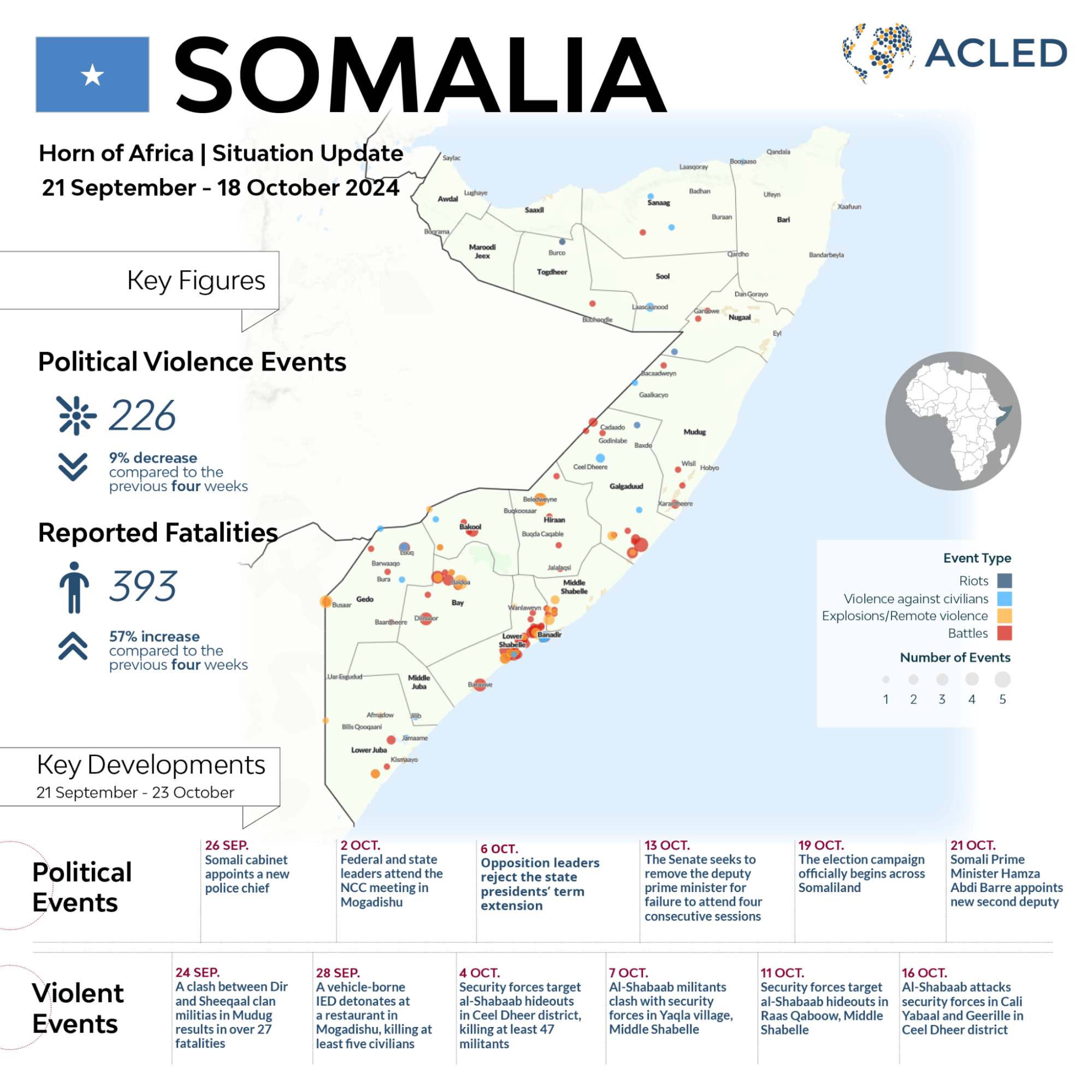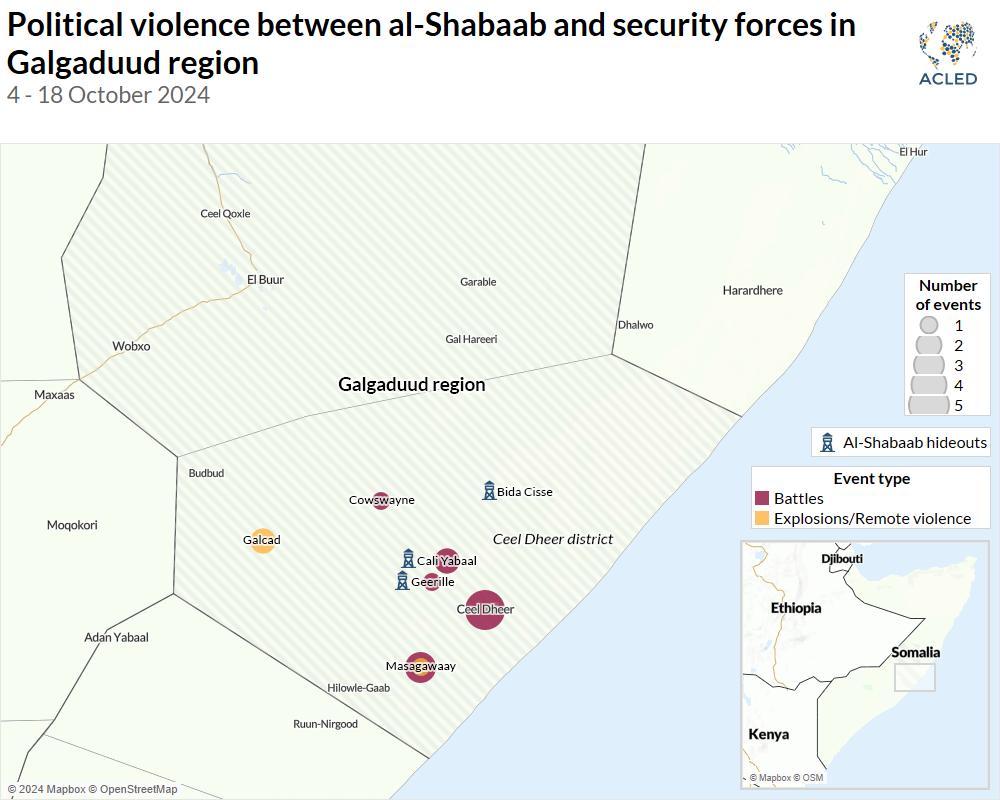Situation Update | October 2024
Controversy over electoral reform sparks debate in Somalia amid al-Shabaab operation
28 October 2024
Somalia at a Glance: 21 September – 18 October 2024
VITAL TRENDS
- ACLED records 226 political violence events and 393 reported fatalities from 21 September to 18 October. Most political violence centered in Lower Shabelle region, where al-Shabaab attacks targeting security forces remained at high levels.
- Galgaduud region had the highest number of reported fatalities, with 189 recorded during the reporting period. Lower Shabelle region followed, with 89 reported fatalities.
- The most common event type was battles, with over 143 events, followed by explosions/remote violence with 57 events. Most of the 99 total battles recorded were between al-Shabaab and security forces, including the African Union Transition Mission in Somalia (ATMIS).

Controversy over electoral reform sparks debate in Somalia amid al-Shabaab operation
On 2 October, Somali federal and state leaders attended the National Consultative Council (NCC) to discuss the state of national security and the election system. During this meeting, the federal government indicated its plan to initiate the process of replacing the indirect clan-based voting system1The indirect clan-based election known as the 4.5 formula consists of a mechanism for sharing political power among four major clans (Darod, Dir/Isaaq, Hawiye, and Rahanweyn/Digil-Mirifle) and the ‘minority’ groups. In this system, top positions in the federal government are reserved for the Hawiye and Darod clans — the two largest Somali clans. Clan delegates vote for state and federal lawmakers based on the 4.5 formula. with universal suffrage for the upcoming national and regional elections in 2026.2Dalmar, ‘Madobe Blocks Hassan Sheikh’s Mandate Extension Plan at NCC,’ The Somali Digest, 6 October 2024 As part of the plan, the government also proposed a one-year term extension for all state presidents until the universal suffrage system is introduced. Although members of the NCC agreed to replace the indirect clan-based election system with a universal suffrage system in May 2023, the discussion during the NCC meeting in October 2024 faced opposition from Jubaland and Puntland states and political parties like Himilo Qaran and Wadajir parties.3Garowe Online, ‘Somalia: Opposition Leaders Decry Presidential Term Extension Plot, Vow Legal Battle,’ 7 October 2024
Similar to the last election extension in 2020, there is a high probability that ongoing operations against al-Shabaab could delay the vote, given security concerns in al-Shabaab-controlled areas. Military operations against the group continued in October as government forces deployed troops to regain control of Ceel Dheer district in Galgaduud region. In Jubaland, al-Shabaab mobilization increased as the group established several bases and checkpoints along the Kismayo, Jamaame, and Afmadow roads.
Jubaland state stands against universal suffrage reform
In May 2023, members of the NCC announced the adoption of a one-person-one-vote system for the next national and regional elections in 2026. As per the agreement, members of the NCC met on 2 October 2024, and the federal government shared its plans to implement universal suffrage for national and regional elections to end the decade-long indirect clan-based election system.4Garowe Online, ‘Inside Somali political leaders’ NCC meeting in Mogadishu,’ 3 October 2024 This plan included a one-year term extension for all four current NCC member state presidents in Galmudug, Hirshabelle, Jubaland, and Southwest states. This extension could potentially influence the upcoming elections as it gives an opportunity for the state presidents to appoint allies to the state election commissions and other influential positions for their re-election.
State administrations are divided over the proposed reforms.5Garowe Online, ‘Somalia Leaders Deadlocked Over Term Extension in Crucial Electoral Reform Talks,’ 5 October 2024 The Jubaland state president, Ahmed Mohamed Islam ‘Madobe,’ left the meeting, rejecting the plan.6Shabelle Media Network, ‘Ahmed Madobe Walks Out of NCC Meeting in Mogadishu, Returns to Kismayo,’ 7 October 2024; Hiiraan, ‘Somalia’s 1PV election timeline at risk as Jubaland’s Madobe resists,’ 5 October 2024 Madobe’s rejection comes amid the backdrop of the upcoming regional elections, which are planned for November and will follow an indirect voting system. This move can be seen as an effort to safeguard his presidency for the next four years.7Shabelle Media Network, ‘Madobe Plans Snap Election in Kismayo Amidst Tensions with Central Government,’ 9 October 2024; Wariyaha Muqdisho, ‘Ahmed Madobe held a special meeting with the Jubaland Traditional Elders,’ Garowe Online, 9 October 2024; Mogadishu24, ‘Jubaland Announces Plan for Indirect Elections, Accuses Federal Government of Manipulation,’ 11 October 2024
Galmudug, Hirshabelle, and Southwest state administrations have agreed to the term extension and universal suffrage. Their support may be linked to domestic politics. These state presidents face fierce opposition at home and need to rally support before the next round of regional elections. Puntland, whose state administration was not present at the meeting,8In January 2023, the Puntland administration announced that it was acting independently from the federal government until the completion of the constitution and, since then, stopped attending NCC meetings. See Horn Observer, ‘Somalia’s Puntland State declares to act as an independent state,’ 11 January 2023 opposes the proposed plan due to a lack of consensus among the state leadership.
Many political elites, including former presidents and prime ministers, have questioned the inclusivity of the NCC, stating that it does not serve the national interest since Puntland failed to turn up and the Sool, Sanaag, and Cayn (SSC) interim administration was not invited to attend.9Garowe Online, ‘Somalia: Opposition Leaders Decry Presidential Term Extension Plot, Vow Legal Battle,’ 7 October 2024; Hiiraan Online, ‘Himilo Qaran Party urges leaders to avoid term extensions as NCC meeting continues,’ 4 October 2024; The SSC administration is a self-appointed administration over the Sool, Sanaag, and Cayn regions in Somaliland and was recognized as the interim administration by the Somali federal government on 19 October 2023. For its part, Jubaland demanded the inclusion of these administrations and other stakeholders — like political parties, women, and youth — in the meeting before agreeing on a term extension and shifting to universal suffrage.10Hiiraan, ‘Puntland Vice President supports Jubbaland’s call for Puntland’s inclusion in NCC talks,’ 6 October 2024
The government attracted opposition from former leaders and political parties due to the proposed election reforms and term extension. Implementation of these changes without a political consensus can lead to violence in the run-up to the vote in 2025-2026. In the period preceding the 2022 elections, tensions increased after Badbaado Qaraan, a section of Somali security forces loyal to the opposition, and security forces clashed in Mogadishu in response to the previous administration’s proposed one-year term extension and changes to the election format that delayed the 2022 presidential election. In December 2021, the Badbaado Qaraa vacated the frontline bases in Central Somalia and arrived in Mogadishu, where they later clashed with security forces.11YouTube @Horn Cable TV, ‘”National safety has not returned. We are going out until we get Farmajo” G/Sare Geylac,’ 27 December 2021
Security forces and al-Shabaab fight for control of Ceel Dheer district
Ceel Dheer is a district in Galgaduud region that borders Mudug, Middle Shabelle, and Hiiraan regions. Ceel Dheer, often considered a military strategic location, offers the perfect hideout for al-Shabaab because it is a forested area where attacks can be coordinated across several regions in Galmudug and Hirshabelle states. With the support of clan militias, security forces conducted counterterrorism operations in February and June but failed to flush out al-Shabaab. Since July, al-Shabaab has been more active in the district, as militants plan to overrun the nearby military bases and strengthen their stronghold positions in Ceel Dheer.12YouTtube @SNTVNEWS, ‘The army and the locals attacked the Khawarij bases in the east of Galgaduud,’ 4 October 2024; YouTube @SNTVNEWS, ‘The National Army has conducted a clearing operation in the forest between Eeldheer district’,’ 3 October 2024
Starting on 3 October, security forces, along with clan militias, began to reintensify their operation against al-Shabaab in Ceel Dheer district. The Abgal clan militias, especially the Wacaysle sub-clan, where the federal president hails from, are supporting the security forces in the fight against al-Shabaab. On 4 October, security forces and Abgal clan militias conducted a security operation that targeted al-Shabaab hideouts in Xuseen Cagey, Dhabaqle, Cali Yabaal, Bida Ciise, and Geerille villages near Ceel Dheer town (see map below). Both sides exchanged gunfire, and 47 militants were reportedly killed. Airstrikes from international forces supported the operation, destroying hideouts, checkpoints, and vehicles. The operation continued for two more days in several villages. From 4 October until 18 October, ACLED records at least 12 distinct battle events and three airstrikes in Ceel Dheer district.
The battle for control over the Ceel Dheer district is a critical moment in the ongoing conflict between the government and al-Shabaab. The outcome of this contest will have significant implications for the security and stability of the southern central regions. Losing control of Ceel Dheer would be a significant strategic setback for the government, empowering al-Shabaab and potentially encouraging them to launch further attacks and expand their territory.
Al-Shabaab’s presence increased in Jubaland
Al-Shabaab’s recent activities in Jubaland suggest the militants’ move to consolidate power, intimidate locals, and undermine government authority. These actions allow the group to extort resources, recruit new members, and gather intelligence for future attacks. On 27 September, the group announced a transportation blockade to Bardera town in Gedo region, which disrupted essential services, hindered economic activity, and extorted resources from travelers and traders. The blockade is a response to the local authority’s suspension of residents’ use of motorcycles to transport goods and people outside the Bardera area.13The information was provided to ACLED from an undisclosed source. By implementing these tactics, al-Shabaab aims to undermine local authorities in Bardera.
In parallel, al-Shabaab deployed several fighters from Middle Juba to areas under Kismaayo and Jamaame districts in August, September, and October. The group mobilized its fighters after security forces in Jubaland state began targeting al-Shabaab in villages in Kismayo and Afmadow districts in July. However, since mid-August, the fighting decreased after security forces cleared al-Shabaab from several villages in Kismaayo district. Al-Shabaab militants also began to employ other strategies to overcome further security forces’ operations and advances to their stronghold position in Middle Juba region. For instance, the group organized Dawrah, or workshops, with local clan elders and militias to reach an agreement on rejecting the government administration and supporting the militants in their ongoing operation against the government.14Mursal, ‘Listen to the Morning News 07-03-1446,’ Al Furqaan,’ 10 September 2024
In September, al-Shabaab established two new bases and checkpoints in the Warfeyle and Baxarsaaf areas in Kismaayo and Jamaame districts, respectively. The militants were equipped with heavy and light weaponry and vehicles, including armored trucks.15Voice of America, ‘Jubaland claimed victory in a battle in Bulo Haji,’ 13 October 2024 They expanded their checkpoints, which the group uses to impose restricted movements on commercial goods and vehicles and to extort money — which functions like a tax commonly known as zakat — to bolster its financial flow. On 26 September, the al-Shabaab zakat unit summoned civilians and elders of the Kala-Guur area near Buulo Xaaji village in the Lower Juba region and imposed a new tax amount to be paid within a week.16The information was provided to ACLED from an undisclosed source.
These workshops with the clan leaders and clan militias, new bases, and checkpoints demonstrate al-Shabaab’s ability to adapt to changing circumstances and exploit opportunities to strengthen and safeguard Jilib town, its stronghold position and command center in Middle Juba since 2010.





